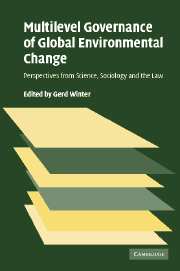 Multilevel Governance of Global Environmental Change
Multilevel Governance of Global Environmental Change Book contents
- Frontmatter
- PREFACE
- Contents
- List of figures
- List of tables
- Notes on contributors
- List of abbreviations
- 1 Introduction
- PART I Earth system analysis
- PART II Society and institutions of global; environmental change
- PART III Self-regulation of industry and the law
- PART IV The potential of the state
- PART V The potential of world regions
- PART VI Formation and implementation of international regimes
- PART VII Improving the instruments of global governance
- PART VIII Fundamental concepts of institutionalising common concern
- 21 Global environmental change and the nation state: sovereignty bounded?
- 22 Whose environment? Concepts of commonality in international environmental law
- 23 Globalising environmental liability: the interplay of national and international law
- 24 The legal nature of environmental principles in international, EU, and exemplary national law
- Index
22 - Whose environment? Concepts of commonality in international environmental law
Published online by Cambridge University Press: 04 May 2010
- Frontmatter
- PREFACE
- Contents
- List of figures
- List of tables
- Notes on contributors
- List of abbreviations
- 1 Introduction
- PART I Earth system analysis
- PART II Society and institutions of global; environmental change
- PART III Self-regulation of industry and the law
- PART IV The potential of the state
- PART V The potential of world regions
- PART VI Formation and implementation of international regimes
- PART VII Improving the instruments of global governance
- PART VIII Fundamental concepts of institutionalising common concern
- 21 Global environmental change and the nation state: sovereignty bounded?
- 22 Whose environment? Concepts of commonality in international environmental law
- 23 Globalising environmental liability: the interplay of national and international law
- 24 The legal nature of environmental principles in international, EU, and exemplary national law
- Index
Summary
The basic issue: distribution of jurisdiction – distribution of benefits
Environmental problems are natural phenomena. They are caused by human activities. But once so caused, they follow the laws of nature. Thus, they tend to ignore political boundaries drawn by man. But the regulatory powers to deal with these problems are distributed according to the principle of territorial jurisdiction. No state has jurisdictional powers outside its borders unless the state where such powers are exercised consents to it. That principle of the territorial distribution of regulatory powers is complemented by the principle of freedom in areas where there is no territorial jurisdiction.
The first problem triggered by this situation is that of effectiveness. How can a state deal effectively with a problem that has its origins elsewhere? Can it be expected that a state deals effectively with a problem the consequences of which are felt elsewhere? In economic terms, this is the problem of externalities. Activities of events taking place in one state have (positive or negative) effects on the territory of other states or in areas beyond national jurisdiction. These externalities pose the major problem in terms of both regulatory effectiveness and equitable allocation of burdens and benefits.
The territorial division of the land surface of the Earth has another, yet related consequence: the benefits derived from the resources situated in a particular territorial state belong to that state. This has been called the principle of sovereignty over national resources.
- Type
- Chapter
- Information
- Multilevel Governance of Global Environmental ChangePerspectives from Science, Sociology and the Law, pp. 539 - 558Publisher: Cambridge University PressPrint publication year: 2006
- 2
- Cited by


